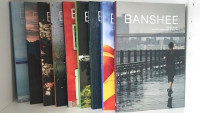
The 13 secrets to writing a really good novel
inews.co.uk – Sunday January 5, 2025

One would imagine that the glamour professions of today – YouTuber, influencer, star athlete, crypto millionaire – would not include the humble old novelist. But guess what? “Writer” often storms to the top of dream career surveys, and it seems that the multitudes still believe they have a novel in them, and not only a video game or an OnlyFans site.
Writing fiction, if taken seriously, is a compulsion, and many who want to complete a whole novel end up living a lifetime of frustration. There are a couple of issues here. Firstly, they think that publication will solve all their problems. It won’t. And secondly, they are often stymied by the same mistakes, both technical and psychological. There are ways around some of these.
Can creative writing be taught? Yes and no. Pure talent cannot. Most of the rest of it really can. As a novelist, literary critic and creative writing tutor, I’ve taught for more than 20 years, and I’ve seen the same problems emerging through my time at Arvon, Birkbeck, City University, and, for the past 14 years, Faber Academy, a writing school which nurtures hundreds of students through its six-month Writing A Novel programme, and has also seen more than 200 of those students’ novels published – including plenty of bestsellers.
So here, I offer a few insights.

8 Craft Books to Inspire Your New Year’s Writing Resolutions
electricliterature.com – Thursday January 2, 2025

Many New Year’s Resolutions are health-centric—a promise to eat healthier, exercise more, or finally quit smoking. But for writers, caring for your creativity is just as central to your wellbeing.
To give you some extra motivation, we’ve rounded up books on writing that are filled with new ways of approaching the craft and practical advice from well-known authors. Whether you’re looking to start a new writing practice or finally get to work on the novel idea you’ve been chewing on for the past few months, these books will give you the inspiration you need to begin.
On Writing: A Memoir of the Craft by Stephen King
With more than 70 books under his belt, Stephen King is a pop culture icon. On Writing is a memoir of his writing career, beginning with his childhood in Maine, where he would submit short stories to science fiction and horror magazines; to publishing his first novel, Carrie; to surviving a car accident that nearly killed him.

The revolution in Irish literary journals
rte.ie – Tuesday December 31, 2024

One of the most frustrating things about trying to break into the writing game is having to listen to the advice of people who have already made it.
They'll tell you to be patient. They’ll tell you that with talent, persistence and a little luck, anyone determined enough will eventually have their day. All of which is fine and may actually be true, though it trivialises for many what can often be incredibly difficult in the moment. Not all of us have the luxury to be persistent, and there are a myriad of reasons why this should be so: Financial pressures, the responsibilities of being a parent, disabilities which take up so much of our time and energy that devoting ourselves wholly to the pursuit of one thing is not only undesirable, it seems nigh on impossible.
What those writers miss, therefore—well-meaning as their advice may be—is that support structures need to be in place to facilitate that necessary persistence. Funding from public bodies is one crucial strand of this. Being able to plug into a network of like-minded artists and writers who are struggling with the same thing is another. But perhaps one that doesn’t get talked about enough is the role of literary magazines; those places we submit to when we’re finally ready to share our writing with other people, which give us the ego-boost we need that we’re on the right track.

A reminder of how good writing happens
poynter.org – Saturday December 28, 2024

Call in the metaphor squad and other writing tips from Poynter's Beat Academy
ew York Times reporter Jeanna Smialek was stalled on a story. She wanted to describe how people of her generation — millennials — were distorting the economy, and all she knew for sure was there was an image she didn’t want to use: the snake and the egg.
“The snake metaphor was gross,” Smialek said. “You don’t want to talk about food moving through a snake in a nut graph. And I’m like, that’s the energy I want to go for, but less disgusting.”
What she came up with was similar, and better. She compared her generation’s economic impact to a person “squeezing into a too-small sweater.”
“At every life stage, it has stretched a system that was often too small to accommodate it, leaving it somewhat flabby and misshapen in its wake.”
We can pause to appreciate the line, but for us at Beat Academy, the real take-home lesson is how Smialek found it.
“If you could only see the hours of time and debate that went into the sweater metaphor,” she said. “I probably made 16 people talk about metaphors with me before I finally came upon one that worked.”

On resisting the pressures of the market
thecreativeindependent.com – Tuesday December 24, 2024

Writer and literary agent Jaclyn Gilbert on resisting easy categorization, honoring the gray areas, and sustainably incorporating feedback.
You are the founder of Driftless Literary, an agenting collective committed to helping authors develop experimental or genre-bending work. What was your vision for the agency and what did it take to get it up and running?
I started Driftless in 2021, when I was in the wake of a lot of transition, spiritually, professionally, as a new parent and as a writer. In my early twenties, I went to a program called the Columbia Publishing Course in New York, and that was basically how I landed my first job in the industry. But after many years of committing to that path, I realized how unsustainable it was for me, not only financially, but creatively. In 2013, when I left publishing to get my MFA, and afterward—when I published my first novel in 2018—I came to see my path through an entirely new lens, a kind of double lens as both an editor/writer.
Moving forward, I knew I wanted to provide authors with the care and attention most agents are unable to provide around the writing process, focused as they are on bringing in sizable commissions around a future book sale. This incentivizes agents to make edits that serve the market, not based on what the work is asking for at its core, and I wanted to be able to offer this as an agent, to carve out a particular niche for this focus.

The Big Five Publishers Have Killed Literary Fiction
persuasion.community – Saturday December 21, 2024

Literary fiction is dead. Or, so we’ve been told. Perhaps we can agree it lies bleeding.
It’s convenient to assume that readers are to blame for killing literary fiction, and publishers have abandoned it because book-buyers are stupid, have bad taste, and just aren’t reading anymore. But what has actually occurred is death by committee.
One hundred years ago, there were dozens of publishing houses and a robust publishing landscape. This is the idea of publishing that so many of us still have stored away in our collective memory—a competitive marketplace in which publishers needed to nurture, court, outbid, and out-promise each other in landing both emerging and established writers. This process gave us—among so many others—Flannery O’Connor, Tom Wolfe, Vladimir Nabokov, and James Baldwin.
No longer. Mirroring many other American industries, publishing has followed the path of consolidation, starting when Random House bought Knopf in 1960. What followed was a fifty-year feeding frenzy of mergers and acquisitions. In 2012, when Random House and Penguin merged, we were left with today’s “Big Five”: Penguin Random House, Hachette, Macmillan, HarperCollins, and Simon & Schuster. The result is a monopsony, a market dominated by only a few buyers. In the absence of genuine competition, monopsonists, like monopolists, have a tendency to reject the laborious pursuit of quality in favor of short-term profit.
We are now at the logical end-point of that process, with the government compelled to step in and block additional mergers in order to keep even a shred of literary competitiveness alive. In 2022, a federal antitrust suit blocked Penguin Random House’s merger with Simon & Schuster. For writers, it was something like a last-minute stay of execution, but the trial laid bare the problems that high-quality fiction faces in a homogenized publishing landscape. Testifying for the government during the trial, Stephen King explained: “Let’s say if you are an agent and your specialty is baseball teams, you have something like 32 teams that you could negotiate with. But when it comes to big publishers, there are five. You know, baseball players have a saying, you can’t hit them if you can’t see them. And you can’t sell books competitively if there are only so many people in the competition.”

Legendary writer Kurt Vonnegut cleverly explains how to write the 3 stories everyone loves
upworthy.com – Sunday December 15, 2024

To be a great fiction writer requires understanding basic story structures and being clever enough to disguise them so your audience doesn’t know they’re watching or reading something they’ve seen before. Academics suggest that there are only a finite number of plots and structures, but that number varies based on who’s doing the talking.
Writer Kurt Vonnegut, best known for his satirical works on American politics and culture, including “Slaughterhouse-Five,” “Cat’s Cradle” and “Sirens of Titan,” was obsessed with the shapes of stories and summed up his views in one powerful sentence: “The fundamental idea is that stories have shapes which can be drawn on graph paper and that the shape of a given society’s stories is at least as interesting as the shape of its pots or spearheads.”
In the video below, Vonnegut explains why the shapes of three different types of stories, from “person gets into trouble” to “boy meets girl” to “Cinderella,” can all be summed up on two axes: the Y represents good and bad fortune, the X represents the beginning and end of a story.

How to write a holiday rom-com for TV, according to the experts
apnews.com – Friday December 13, 2024

Have you ever watched a holiday rom-com on Hallmark Channel or Lifetime — or any of the other many networks and streamers that now air them — and thought, “I could write that”? It’s harder than you may think — but just as fun.
Regular writers of Christmas fare for Hallmark Channel, Great American Family and Lifetime share the ins and outs, misconceptions and exceptions to writing a Christmas TV movie.
Christmas is 365 days a year
Some say the holiday season goes by quickly, but for those whose jobs depend on it, Christmas is always on the brain. Writers are always looking for their next gig so there’s no real rest or downtime between assignments. The pressure is on to come up with ideas, get them sold and get writing so the films can get made and ready to air.
“I feel like when I’m not writing Christmas movies I’m pitching Christmas movies, so I feel like it’s Christmas all year round,” said Anna White, who executive produced and wrote “The Holiday Junkie,” directed by and starring Jennifer Love Hewitt, premiering Saturday on Lifetime.
It can be challenging, however, to get into the mindset of Christmas when life outside doesn’t match the world you’re creating. Rick Garman, who wrote the 2023 Hallmark Channel hit film “Christmas on Cherry Lane,” along with its three sequels this year for Hallmark+, often writes Christmas movies in June.

Simon Linacre assesses the state of predatory publishing, 15 years since the term was first coined
researchinformation.info – Monday December 9, 2024

As someone who worked in academic publishing throughout the 2010s, one remembers that the term ’predatory publishing’ was often accompanied by a round of sniggers and smirks, as if those responsible for these fake journals were like the naughty boys at the back of the class, eliciting snorts of laughter for their outlandish behaviour. In the early days of industry awareness of the issue, there was a feeling that while it was a problem to take seriously, it wasn’t really a serious problem.
However, as our understanding grew and some academics published studies on the phenomenon, it felt like the issue began to gain more credence as something to be concerned about. Landmark studies such as Shen and Bjork (https://bmcmedicine.biomedcentral.com/articles/10.1186/s12916-015-0469-2) and predatory publishing godfather Jeffrey Beall’s own work with his increasingly famous lists, raised awareness that not only were things being published that shouldn’t on a large scale, but that in some cases research funding was facilitating it.
The height of awareness probably came at the end of the decade when Grudniewicz et al (https://www.nature.com/articles/d41586-019-03759-y) provided a now well cited, well adopted definition of what predatory publishing actually meant, and the US Federal Trade Commission found OMICS International had effectively defrauded authors paying APCs to its journals over a six year period to the tune of over $50m (https://www.ftc.gov/legal-library/browse/cases-proceedings/152-3113-omics-group-inc). Now many more academics were both aware of what predatory journals were, and that it was a lucrative business to dupe authors into publishing their research in them.

Writing Tips From Your Favourite Authors
trillmag.com – Saturday December 7, 2024

Between them, they have sold over 27 million copies worldwide, and now David Nicholls, Richard Osman, and Matt Haig are giving aspiring authors their best writing tips.
One of the biggest struggles for writers isn’t the writing itself, it’s the ‘not knowing where to start’ or not having the confidence to put yourself out there. But, maybe after this read you can relish in knowing that some of your favorite authors had the same concerns and insecurities at the start of their journey. And, well, look at them now…
1. Inspiration
The first part of writing is finding inspiration for a story. Many authors use insights from their own lives and these three best-selling writers are no different.
Richard Osman said at the Cheltenham Literature Festival: “I love writing about what happened yesterday, so you’ll all be in the next scene. Unfortunately, some of you may get murdered [in the plot.]”
Get the free newsletter | Submit a news item or article | Get Writers' News for your website





